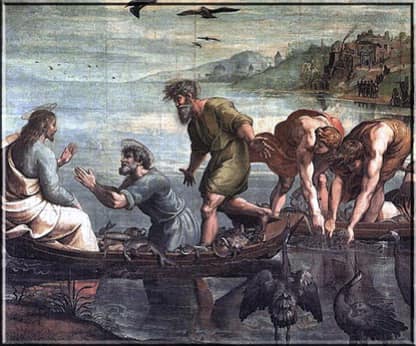 Gospel of 3 September 2020
Gospel of 3 September 2020
Thursday of the Twenty-Second Week in Ordinary Time
Luke 5:1-11
They left everything and followed him
Jesus was standing one day by the Lake of Gennesaret, with the crowd pressing round him listening to the word of God, when he caught sight of two boats close to the bank. The fishermen had gone out of them and were washing their nets. He got into one of the boats – it was Simon’s – and asked him to put out a little from the shore. Then he sat down and taught the crowds from the boat.
When he had finished speaking he said to Simon, ‘Put out into deep water and pay out your nets for a catch.’ ‘Master,’ Simon replied, ‘we worked hard all night long and caught nothing, but if you say so, I will pay out the nets.’ And when they had done this they netted such a huge number of fish that their nets began to tear, so they signalled to their companions in the other boat to come and help them; when these came, they filled the two boats to sinking point.
When Simon Peter saw this he fell at the knees of Jesus saying, ‘Leave me, Lord; I am a sinful man.’ For he and all his companions were completely overcome by the catch they had made; so also were James and John, sons of Zebedee, who were Simon’s partners. But Jesus said to Simon, ‘Do not be afraid; from now on it is men you will catch.’ Then, bringing their boats back to land, they left everything and followed him.
Reflexion
Today’s Lucan account of the call of St Peter violates and debunks three modern assumptions:
1. Knowledge and experience guarantees results.
2. Personal identity is based on autonomy from all external authority.
3. Choice of a candidate should be made on the basis of personal merit.
Peter’s vast knowledge and experience as a fisherman did not guarantee him a catch. In fact, the carpenter’s son seems to know more about fishing than he did.
It seems ludicrous and insulting for a fisherman to take instructions from a carpenter on a trade which the former should be an expert. To listen to the latter would amount to ceding all authority to one who had no authority to speak on the matter.
Finally, one could question our Lord’s choice. Being the omnipotent and omniscient God that He is, couldn’t our Lord come up with a better candidate, especially when the candidate of His choice seems doomed for failure?
What unites all these three modern assumptions which seem to be important fundamental assumptions of modern times is the exclusion of God from the picture.
In fact, we see here in the call of St Peter and in fact, in the vocation of every Christian, the reversal of the sin of Adam. Adam and Eve, who submitted to the temptations of the serpent, were guilty of seeking knowledge independent of the God’s wisdom, autonomy free from obedience to God’s Holy Will, and sought an identity that desired to supplant the sovereignty of God by wanting to become “gods” in their own right.
In today’s passage, we see a Peter who is unlike Adam - he was humble enough to listen to our Lord and obey His instructions and finally acknowledged his own sinfulness and unworthiness. And yet our Lord calls him. This story reminds us that we are indeed meant to be gods, not by our own doing, but in the words of St. Athanasius, to become by grace, everything which God is by nature. The Devil’s lie to Adam is not that one day we can become gods, but that we can become gods without any reference to Almighty God and without the grace poured out on us through the sacrifice of His Son on the cross.
So, the real tragedy is that we have fundamentally misunderstood the nature of divinity. Neither divinity nor humanity are defined by power, and a limitless autonomy is not what makes one a god. On the contrary, unlimited autonomy is what makes one an antichrist. Absolute autonomy does not free us from the authority of God, but subjugates us to the tyranny of sin. When we conflate freedom with autonomy — and thereby pathologise obedience — we do not become divine; we become demons.
If such autonomy demonises us, it is humble obedience which divinises us. So do not be afraid of your unworthiness or lack, but trust in the Lord’s saving and sanctifying grace and obey His word, and He will make you, spiritual landlubbers that you are, into spiritual fishermen to catch men for the kingdom of God.
